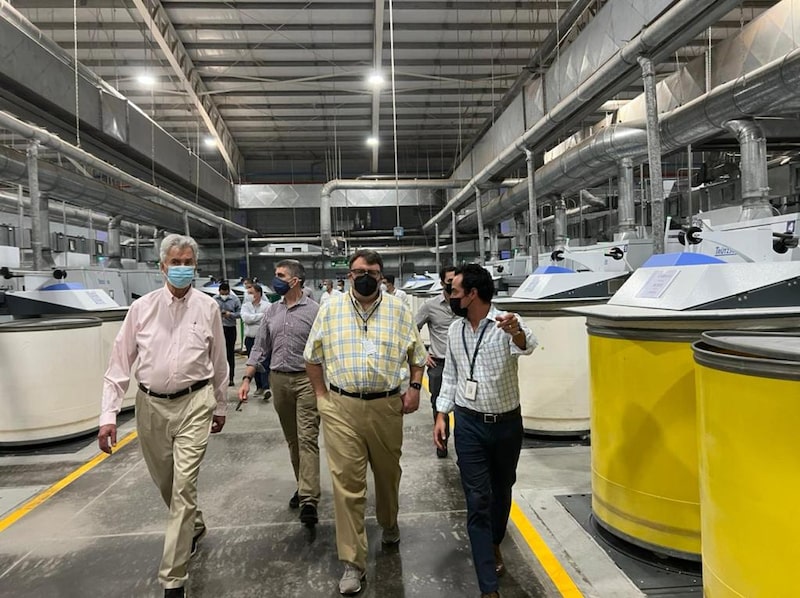San Pedro Sula — A group of business leaders from four countries set out in December 2020 to create an organization to unify efforts to generate sustainable jobs that could contribute to creating the ‘American dream’ within Central America’s northern triangle of Guatemala, Honduras and El Salvador.
“We believe the best social program is for a person to have a good job, a respectable salary, good benefits and to be in a company that takes care of the community and families,” Greg Huger, executive director of HUGE Business and Investment Council told Bloomberg Línea.
The nonprofit business association’s name is an acronym for Honduras, the USA, Guatemala and El Salvador, and for its founders represents the first joint effort by the private sector of the three Central American countries and their US counterparts to create massive employment.
Irregular migration from the three countries has increased, while deportations of citizens back to those countries totaled 69,188 in the first four months of 2022, up 107.8% on the same period of 2021, according to the International Organization for Migration (IOM).
Seventy percent of irregular migrants from Central America use a human smuggler, according to data from Mexico’s Interior Ministry, such as the more than 50 migrants who died recently after being trapped in an abandoned trailer in San Antonio, Texas.
Various public and private organizations have addressed the main reasons why people decide to make the overland journey to the United States, and fundamentally it is because they are driven by the unacceptable living conditions they face in their respective countries.
HUGE’s goal is to mobilize $10 billion in new private investment over five years, creating two million jobs in the four countries, but with a special focus on northern Central America and linked commercially to the United States.
Common commitments
Addressing the root causes of irregular migration from the region is also on the White House agenda.
In May 2021, US Vice President Kamala Harris launched the ‘Call to Action’, which involves everything from programs for access to food and health, to financial inclusion and combating climate change.
The initiative also includes agreements with companies and organizations to make investments to help address the causes of the exodus from Central America, and such commitments were reaffirmed during the IX Summit of the Americas, held in June in Los Angeles.
“We have the same goals as Vice President Harris’ Call to Action and her Partnership For Central America, which is an organization she created to advance it,” Huger said.
The common vision prompted several of HUGE’s founders to participate in the Summit of the Americas to exchange ideas with the vice president and other officials and the private sector from the countries involved.
Commitments announced
In the year and a half since its foundation, HUGE has mobilized $3.2 billion in new investment for the creation of 165,000 new jobs, Huger said.
Among the plans are three energy projects in Honduras. One will bring compressed natural gas from Louisiana to the Central American country to convert power plants that are using heavy crude oil as an energy source to natural gas, “which is much cleaner and ultimately cheaper,” added the executive director of the business organization.
In addition, one of the founders is building a hydroelectric power generation plant with an investment of $680 million to produce 200 megawatts of electricity, while there is also a pumped water storage project, which will generate 1,200 megawatts in its first phase and 3,600 megawatts in its final stage.
“These three projects represent a $2 billion investment effort to create 26,000 jobs,” Huger added.
In addition, there are four spinning plants that will manufacture yarn for the textile industry that used to come from China, making the region self-sufficient in this raw material.
In Guatemala, two new industrial parks are planned, implying an investment of $180 million, in addition to a highway with a $160 million investment.

“That is a reality now, we are not talking about dreams or people who are in a theoretical world, but they are business leaders who are making those investments, and we are making an effort to facilitate them for other entrepreneurs and companies looking to make that kind of investment in the region,” Huger said.
A graduate of Georgetown University, Huger attended the Johns Hopkins School of Advanced International Studies, and rose to the rank of Minister-Counselor in the US Diplomatic Corps.
Throughout his more than 40-year career, he has held senior executive positions in the public and private sectors, from the US Agency for International Development (USAID) and the Peace Corps to Unocal Corporation, Deere & Company, and Bechtel International, with positions on five continents.
Nearshoring
One of HUGE’s aims is to take advantage of nearshoring opportunities to bring manufacturing and services closer to domestic markets in the Americas.
Their formula is based on the experience of their business leaders, who have been in their respective businesses for decades and therefore know other entrepreneurs and companies in the same industries, but who are in China and are now facing challenges there.
The logistics crisis caused by the Covid-19 pandemic, creating difficulties in transportation that have impeded the timely arrival of products manufactured in China to the United States, is forcing companies to look for new options.
“Also in China, they have geopolitical and human rights issues that prevent them from getting cotton into the US, and that gives us an advantage,” Huger said.
The third factor is China’s demographics. Due to the 30-year-plus one-child policy, the country is losing more than 100,000 people every year to migration and who should normally be in the labor force.
“They are becoming less and less able to be the main supplier of products worldwide, and we in our region have a population of 50 million people, and many of them are of working age,” Huger said.
Another advantageous factor is that the founding members of the organization are people who have lucrative and transparent businesses, he added.
“They have experience and give evidence in their own businesses of good ways to run a business. When they go and talk to a US company about the idea of coming here, they have credibility, because they are doing it right.”
In addition, HUGE aims for the infrastructure and logistics being developed to help other companies without experience in the region to take advantage of the benefits and set up shop in each of the countries.
New jobs
Much of the work of the entrepreneurial initiative is based on preparing people to fill the massive number of jobs they hope to create.
Many of the investment projects are focused on textiles and apparel, and HUGE is working with the Honduran Maquila Association (AHM), the Chamber of the Textile, Apparel and Free Zones Industry of El Salvador (CAMTEX) and soon with the Apparel and Textile Association of Guatemala (Vestex) to identify the skills that need to be developed within the three countries.
Also joining the efforts are universities, such as the Universidad Tecnológica Centroamericana (Unitec) in Honduras and North Carolina State University, considered one of the best textile schools in the United States.
HUGE is also collaborating with USAID, which has a program to finance part of the training in the textile industry.
“We are looking to work hand-in-hand with them and are creating a very strong program, not only in the textile area, but in other areas that we are going to develop,” Huger said.
The organization also has close relations with the Inter-American Development Bank (IDB) and the World Bank, who are supporting the work of the business association, and will participate in future activities being planned with potential investors, as well as other initiatives.
“We are doing well ,and that is in spite of the negative factors such as the pandemic and other things, but we are working with the positive forces,” Huger said.
Translated from the Spanish by Adam Critchley





